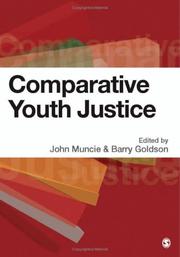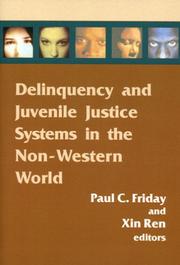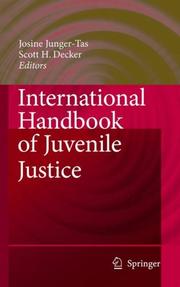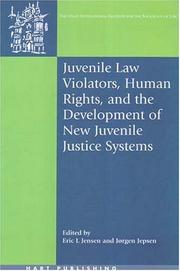| Listing 1 - 10 of 17 | << page >> |
Sort by
|
Book
ISBN: 1554417740 Year: 2006 Publisher: Chicoutimi : J.-M. Tremblay,
Abstract | Keywords | Export | Availability | Bookmark
 Loading...
Loading...Choose an application
- Reference Manager
- EndNote
- RefWorks (Direct export to RefWorks)

ISBN: 1412911354 1412911362 9781412911351 9781412911368 9781847878236 Year: 2006 Publisher: London Sage
Abstract | Keywords | Export | Availability | Bookmark
 Loading...
Loading...Choose an application
- Reference Manager
- EndNote
- RefWorks (Direct export to RefWorks)
Reflecting on contemporary juvenile justice reform in England and Wales, this text also considers the issue within the context of other Western jurisdictions, identifying major international differences in juvenile policy and practice.
Book
ISBN: 1472559959 128082929X 9786610829293 1847312853 Year: 2006 Publisher: Oxford Hart Publishing
Abstract | Keywords | Export | Availability | Bookmark
 Loading...
Loading...Choose an application
- Reference Manager
- EndNote
- RefWorks (Direct export to RefWorks)
This volume brings together scholars and practitioners specialising in juvenile justice from the US, Europe, alongside scholars from Africa and Asia who are working on human rights issues in developing countries or countries in transition. The book thus presents two types of papers, the first being descriptive and analytical academic papers on whole systems of juvenile justice or certain parts thereof (e.g., aftercare, restorative justice, etc.). These topics are presented as essential for the development of new juvenile justice systems. The second group of papers deal with efforts to promote reform through international activity (PRI, DCI, DIHR), and through efforts to utilise modern theory in national reforms in developing countries (Malawi, Nepal, and Serbia) or in countries experiencing current or recent political and systemic changes or developments (South Africa, Germany, and Poland). The volume is also intended to throw light on recent trends in juvenile crime in various countries, the relationship between actual developments and popular and political perceptions and reactions to such developments, including the efforts to locate effective alternatives to the incarceration of young offenders. At the same time as the search for such alternatives is being intensified through international exchange and experimentation, the amelioration of harsh measures against juvenile law violators is often countered by political and public outcries for security and demonstrative public intervention against misbehavior. A streak of new moralism is clearly discernable as a counteracting force against more humane reform efforts. The volume throws light on developments in the actual parameters of juvenile offending, public and political demands for security and public intervention, and measures to provide interventions which are at the same time compatible with international human rights instruments
Juvenile delinquents --- Juvenile justice, Administration of --- Children's rights
Book
Year: 2006 Publisher: [Rockville, Md.] : U.S Dept. of Health and Human Services, Substance Abuse and Mental Health Services Administration,
Abstract | Keywords | Export | Availability | Bookmark
 Loading...
Loading...Choose an application
- Reference Manager
- EndNote
- RefWorks (Direct export to RefWorks)
Book
Year: 2006 Publisher: Washington, D.C. : U.S. Dept. of Justice, Office of Justice Programs, Office of Juvenile Justice and Delinquency Prevention,
Abstract | Keywords | Export | Availability | Bookmark
 Loading...
Loading...Choose an application
- Reference Manager
- EndNote
- RefWorks (Direct export to RefWorks)

ISBN: 0820413852 Year: 2006 Publisher: New York Lang
Abstract | Keywords | Export | Availability | Bookmark
 Loading...
Loading...Choose an application
- Reference Manager
- EndNote
- RefWorks (Direct export to RefWorks)
Children --- Child witnesses --- Evidence, Expert --- Forensic sciences --- Juvenile justice, Administration of --- Legal status, laws, etc

ISBN: 9781881798675 1881798674 Year: 2006 Publisher: Monsey Criminal justice press
Abstract | Keywords | Export | Availability | Bookmark
 Loading...
Loading...Choose an application
- Reference Manager
- EndNote
- RefWorks (Direct export to RefWorks)
Juvenile delinquency --- Juvenile justice, Administration of --- Administration of juvenile justice --- Delinquency, Juvenile --- Juvenile crime --- Law and legislation --- Criminal justice, Administration of --- Conduct disorders in children --- Crime --- Juvenile corrections --- Reformatories

ISBN: 9780802092199 9780802094506 0802092195 9780802094506 9780802092199 0802094503 Year: 2006 Publisher: Toronto ; Buffalo : University of Toronto Press,
Abstract | Keywords | Export | Availability | Bookmark
 Loading...
Loading...Choose an application
- Reference Manager
- EndNote
- RefWorks (Direct export to RefWorks)
Female juvenile delinquents --- Female juvenile delinquents --- Juvenile justice, Administration of --- Juvenile justice, Administration of --- Jeunes délinquantes --- Jeunes délinquantes --- Justice pour mineurs --- Justice pour mineurs --- History --- History --- History --- History --- Histoire --- Histoire --- Administration --- Histoire --- Administration --- Histoire

ISBN: 1402049706 1402044003 9400795408 Year: 2006 Publisher: Dordrecht : Springer,
Abstract | Keywords | Export | Availability | Bookmark
 Loading...
Loading...Choose an application
- Reference Manager
- EndNote
- RefWorks (Direct export to RefWorks)
This comprehensive reference work presents an in-depth analysis on the juvenile justice systems of 19 different countries, both in EU-member states (old and new) and in the United States and Canada. The book is the result of research conducted by a group of outstanding scholars working in the field of juvenile justice. The book reflects a collective concern about trends in juvenile justice over the past two decades; trends that have begun to blur the difference between criminal and juvenile justice. The introduction highlights similarities and differences between the various systems, identifying three clusters of countries with a similar approach to juvenile justice. In particular, differences are found between the Anglo-Saxon countries, and continental Europe. The former have a more formal "justice" approach, with a strong emphasis on the accountability of juveniles, "just desert" principles, and retribution, while the latter still operate on a "welfare" philosophy. Two special systems, the Scottish Hearing system and the Scandinavian model, are presented as well.
Juvenile justice, Administration of. --- Juvenile delinquency. --- Delinquency, Juvenile --- Juvenile crime --- Conduct disorders in children --- Crime --- Juvenile corrections --- Reformatories --- Administration of juvenile justice --- Juvenile justice, Administration of --- Criminal justice, Administration of --- Law and legislation --- Criminology. --- Criminal Law. --- Criminology and Criminal Justice, general. --- Criminal Law and Criminal Procedure Law. --- Crimes and misdemeanors --- Criminals --- Law, Criminal --- Penal codes --- Penal law --- Pleas of the crown --- Public law --- Criminal procedure --- Social sciences --- Legal status, laws, etc. --- Study and teaching --- Criminal law.

ISBN: 1841136360 9781841136363 1841136379 Year: 2006 Publisher: Oxford Hart
Abstract | Keywords | Export | Availability | Bookmark
 Loading...
Loading...Choose an application
- Reference Manager
- EndNote
- RefWorks (Direct export to RefWorks)
This volume brings together scholars and practitioners specialising in juvenile justice from the US, Europe, alongside scholars from Africa and Asia who are working on human rights issues in developing countries or countries in transition. The book thus presents two types of papers, the first being descriptive and analytical academic papers on whole systems of juvenile justice or certain parts thereof (e.g., aftercare, restorative justice, etc.). These topics are presented as essential for the development of new juvenile justice systems. The second group of papers deal with efforts to promo
| Listing 1 - 10 of 17 | << page >> |
Sort by
|

 Search
Search Feedback
Feedback About UniCat
About UniCat  Help
Help News
News